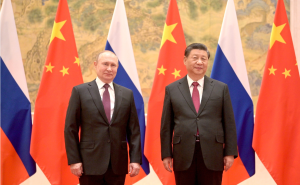The Diplomat author Mercy Kuo regularly engages subject-matter experts, policy practitioners, and strategic thinkers across the globe for their diverse insights into U.S. Asia policy. This conversation with Dr. Bonny Lin – senior fellow for Asian Security and director of the China Power Project at the Center for Strategic and International Studies (CSIS) ̶ is the 308th in “The Trans-Pacific View Insight Series.”
Evaluate the outcomes of the recent Xi-Putin meeting on China-Russia relations.
The February 4 meeting between Chinese leader Xi Jinping and Russian President Vladmir Putin marked a significant milestone in China-Russia relations. The joint statement was unprecedented in both its length and its comprehensive identification of the wide range of areas of cooperation between the two countries. It characterized the relationship as “superior to political and military alliances of the Cold War era” and said there are “no limits, there are no ‘forbidden’ areas of cooperation.” Instead, “strengthening of bilateral strategic cooperation is neither aimed against third countries nor affected by the changing international environment and circumstantial changes in third countries.”
This statement had a subtle but important change – China is no longer saying that it will not ally with Russia. Since 2001, both countries agreed to three requirements for their relationship: “no alliance, no conflict, and no targeting any third country.” By 2017, some Chinese academics assessed that China-Russia relations should develop to be “not an alliance, but better than alliances.” In mid-2021, Chinese Foreign Minister Wang Yi adopted this categorization. Now, Beijing has dropped references to “not an alliance.” This signals that both sides are set on deepening relations, even as tensions escalate over Ukraine.
Analyze Beijing’s position and perspective on escalating Russia-Ukraine tensions.
To date, Beijing has largely adopted a wait-and-see approach to developments in Ukraine. Beijing has expressed its sympathy and support for Russia’s security concerns and has stated that it opposes NATO’s continued expansion. Beyond that, Beijing has been relatively silent on Ukraine, though individual PRC scholars have voiced thoughts on what China might do.
There is no reason for Xi Jinping to show his cards now. And this is because many Chinese commentators believe that Russia is using military tensions over Ukraine to negotiate with the West and will not invade. Chinese analysts have noted that it makes no sense that Russia has massed troops near Ukraine for months. This long period has afforded the United States, United Kingdom, and NATO time to flow troops to the region and prepare potential sanctions against Russia, increasing the costs of a potential invasion.
Analyze the relationship between China and Ukraine.
China has had a healthy and positive relationship with Ukraine. If China provides clear, public guarantees of support to Russia now and conflict does not break out in Ukraine, then China would have damaged its relationship with Ukraine without needing to.
Currently, China’s positions on Ukraine and Russia provide Beijing with a range of political, economic, and military options to assist Moscow if needed. At the same time, if tensions de-escalate, Beijing has left itself ample room to continue relations with Ukraine.
What is at stake for Xi as tensions escalate or if conflict ensues?
There is more at stake for Xi if conflict erupts over Ukraine. China would be forced to take a position and choose a side. This would test China’s relationship with Russia. Similarly, the United States, Europe, and even countries in the Indo-Pacific may recalibrate relations with China based on Beijing’s response.
If we interpret the China-Russia joint statement literally (that their relationship will not be “affected by the changing international environment and circumstantial changes in third countries”), China is likely to maintain its ties and engagements with Russia if conflict erupts. This means that China would not heed international calls to sanction or punish Russia. Beijing could try to make the case that its relationship with Russia should be based on China-Russia dynamics and not how Russia deals with a third country. If Beijing assesses that the United States or NATO was at fault for starting the conflict, China could even provide more support to Russia.
A business-as-usual PRC response, however, would be viewed by the international community as supporting Russia. It could undermine PRC efforts to position itself as a global leader and norm setter. It also risks inviting U.S. and Western sanctions on China for supporting Russia, though Beijing might assess that the United States may be wary of pushing China even closer to Russia.
China needs Russia as a strong and staunch friend. The two have shared core threat assessments: fears of military “encirclement” led by the United States; a deep suspicion that the United States seeks to undermine their political systems and promote “color revolutions”; and concerns that the United States and its allies and partners are using economic sanctions, technological decoupling, and other means to undermine both countries’ development.
Assess Beijing’s view on the Russia-Ukraine crisis vis-à-vis cross-strait tensions.
Given Xi’s calls for the PLA to prepare for the worst and be prepared to fight wars, he cannot discount the possibility that China might find itself in a situation similar to Russia in the future – having to use military force against a neighbor that is backed by the United States and an international coalition. This could be over Taiwan, the Senkakus, the Spratlys, or along the China-India border. In these scenarios, Russian support would be critical for helping China weather international political and economic sanctions. For there to be any possibility of future Russian support, Xi would have to be willing to support Russia now in the event of a conflict over Ukraine.

































